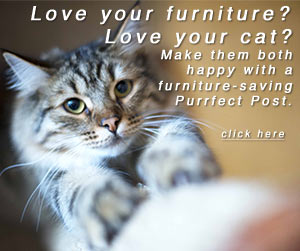Stop Doing These Things to Your Cat Right Now

If you have a cat, you know that sometimes it can be difficult to know exactly the right way to take care of him. With so many choices of foods, decisions to make on types of litter, and controversies about vaccinations, your head may be spinning. To make things a little easier, we've compiled a short list of things you should definitely not be doing to your cat.
Don't Overfeed Your Cat
We know that it's fun to feed your cat and give him treats. But cats that stay indoors and don't prowl and hunt for a living can easily become overweight. Obesity leads to an increased risk of many feline health problems, including diabetes, arthritis, and heart disease.
Find other ways to show love to your cat than by giving extra treats and food.
Don't Feed Your Cat the Wrong Food
Cats have specific food requirements that are based on their age and medical conditions. Feeding a diet meant for another species or a cat that is in a different life stage could cause your kitty harm.
Ask your veterinarian for specific recommendations for your cat's diet.
Don't Skip Veterinary Visits
If you want your cat to have the happiest, healthiest life possible, don't forgo her doctor visits. We know it can be difficult to get a cat in a carrier, take her on a car ride, and get her out at the vet's office. Don't make the critical mistake of thinking that, since your cat stays inside, she doesn't need to visit her doctor.
Indoor cats still need routine physical examinations. The doctor can often catch problems earlier that way, long before you will notice signs of illness from your stoic feline friend. Cats that stay indoors may also still need some preventative medications and vaccinations.
Follow your veterinarian's advice regarding flea, heartworm, and tick preventative, vaccinations, fecal examinations, dental care, and routine testing. Your cat's veterinarian is the best person to evaluate your individual cat and make personalized recommendations for his circumstances and health history.
Don't Leave All the Grooming to Your Cat
Be sure to brush your cat routinely. It can be easy to assume that cats are "self-cleaning" because they spend so much time licking meticulously at their fur. And it's true that many of them do a great job of keeping themselves clean.
However, the more loose fur you can get out of your kitty's coat with a soft brush, the less she will swallow. That's right, because of how her tongue works, most of the fur your cat licks out of her coat gets ingested, and that can lead to hairballs and constipation. Also, many cats can't keep their coats free of mats like you can by routinely brushing. Once matted up, it can be painful for your cat to be brushed or groomed.
Don't Skimp on Litter Boxes or Scratching Posts
Even though our cats gain a lot by living with us instead of outside on their own, like longer, safer lives, they give up a lot of good things to be our pets, too. For instance, they have to use a litter box.
A litter box is probably not your cat's first choice for eliminating. When it's dirty and contained in a small space, it's a lot like when you have to venture into and use a porta-potty at a busy outdoor concert. Yuck.
Do your cat a favor and provide more than one litter box and keep it as clean as you possibly can. Not only will this improve your cat's quality of life, but it will make it much less likely that you will end up with cat urine on your sofa.
The same goes for good scratching posts. When cats move in with us, they give up having trees to scratch on, and it can be pretty hard for them to adjust. Scratching helps cats release stress, keep their muscles and nails healthy, and mark their territory. So provide your cat with some great scratching posts to make up for the fact that you don't have trees in your house.
Don't Play Dress Up with Your Cat
OK, this one isn't a hard and fast rule, but many cats don't like to be put into costumes. In fact, in can be downright scary and traumatic for some of them.
You can find out more about this issue, including how to determine whether your cat is up for playing dress-up or not here: "Cat Costumes: Purr-ific or Cat-astrophe?"
Don't Get a New Cat and Throw the Two Right Together
Your cat is the king of your castle, not you. That may be hard for you to accept, but it's true. And he can be a finicky leader, prone to throwing fits and having tantrums. The fastest way to cause upheaval in your home is to bring a new cat home and toss her in with your resident cat without so much as a "how do you do."
Take your time introducing cats to ensure that your resident cat doesn't feel like he needs to guard his resources and your new cat doesn't get bullied by your resident cat or become the bully herself.
Read "How to Introduce a New Cat to a Household that Already Has a Cat" before you bring a new cat home, so you'll know the best way to proceed.
Don't Use Negative Reinforcement
No one likes to be yelled at, tossed aside, or hit; not even your cat. So if you're doing any of those things, stop! Don't worry; your cat can be trained, but negative reinforcement doesn't work well to get the behavior you want. In fact, it can scare your cat and result in negative behaviors that you won't like very much.
Instead, use positive reinforcement to train your cat. This involves showing him what you want him to do and giving him praise and treats when he does it. Clicker training is a fantastic way to train cats, and you'll have the added benefit of developing an extra close bond with your feline friend.
You May Also Like These Articles:
Big Cats Love Boxes Too! VIDEO
Will My Cat Love Me Less If I Feed Her Less?
Why Does My Cat Sleep on My Head?
Why Do Some Cats Carry Food Out Of Their Bowls to Eat It?
Cats Have Personality Traits Similar to Humans
Why Do Cats Knock Things Over?
Notice: Ask-a-Vet is an affiliated service for those who wish to speak with a veterinary professional about their pet's specific condition. Initially, a bot will ask questions to determine the general nature of your concern. Then, you will be transferred to a human. There is a charge for the service if you choose to connect to a veterinarian. Ask-a-Vet is not manned by the staff or owners of CatHealth.com, and the advice given should not delay or replace a visit to your veterinarian.





